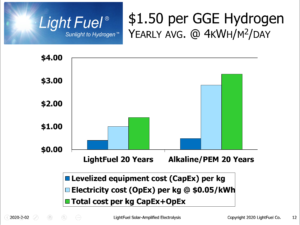Lightfuel’s Solar-Amplified Hydrogen Generators address carbon-reduced,
carbon-neutral, and zero-carbon transportation in three ways:
Hydrogen Fuel….From Sunlight!
An installation of only about 20 of our LFG-80LH panels, or about the size of a modern garage roof, will provide enough hydrogen for a family with two fuel cell electric vehicles. While the cost of a small residential compressed hydrogen storage and dispenser remains an entry barrier to this market, a Planned Residential Development (PRD) of 8 to 12 homes could easily afford a single centralized compressed storage and dispenser unit. Toyota, Hyundai, and Honda are currently producing hydrogen fuel cell cars. BMW (with Ford), Audi, and General Motors have fuel cell cars in development. The major barrier to customer acceptance remains the lack of a hydrogen infrastructure. Lightfuel’s Solar-Amplified Hydrogen Generators will be prefect for ultra-distribution for residential to neighborhood-sized refilling. And we will also be competitive in large centralized projects, and for truck and bus fleets.
Liquid Fuels from Syn-Gas
Hydrogen produced with our LFG-80LH panels can be combined with carbon monoxide (CO) gas, derived from carbon dioxide, to form the syngas precursor that the F-T process converts into liquid fuel replacements for gasoline and diesel. Because our hydrogen is already produced either without carbon byproduct when renewables provide the small overvoltage, or 66% less carbon if supplied by fossil-fueled grid power, the cycle is carbon-neutral or nearly so as long as the conversion to CO is also accomplished with sunlight, and there are companies working on this part of the cycle today. The resulting fuels require no infrastructure changes; cars, pipelines, and filling stations remain the same.
Electric Cars: Distributed Electricity Storage
Just as our LFG-80LH panels are great for peak-shaving and matching the output of renewables to grid demand, they will also play an important role in matching grid supply to recharging habits of electric car owners. When these vehicles become more commonplace, the strain that collective recharging will place on the grid will need to be carefully managed, and we believe our Solar Hydrogen Generators will be an integral part of that management.
Of course, transportation is not limited to cars. Boeing and Ford are collaborating on
integrating Ford’s hydrogen ICEs from their Fusion model into Boeing aircraft.
